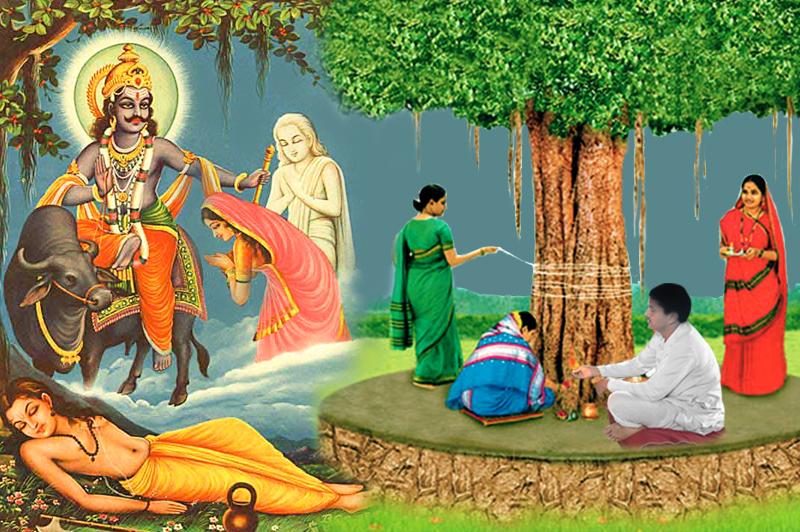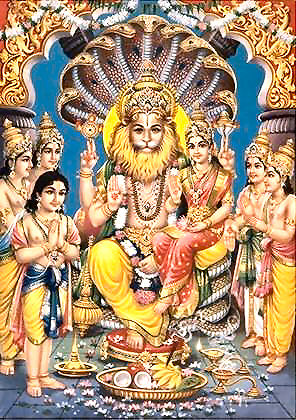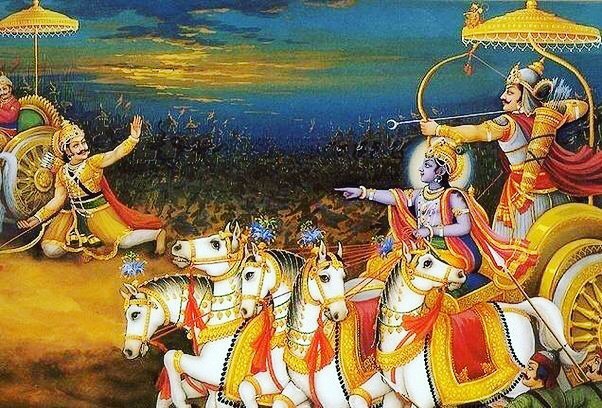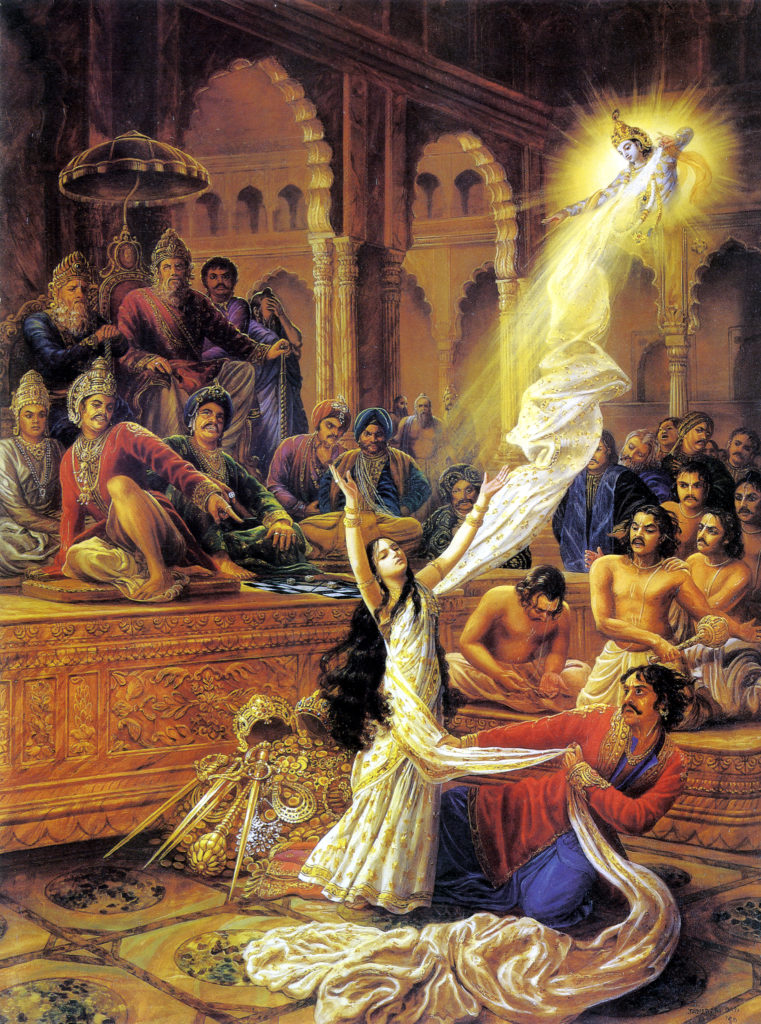Author – Awadhesh Sharma
King Shantanu of Kuru dynasty was on a hunting expedition in the forest along the River Ganga. On the way he noticed a woman coming from the direction of the river. She was of a flawless beauty resembling an Apsara or nymph. The king was mesmerised by her charm. The lady also saw the king and was attracted to him. As she came closer, the king introduced himself and praised her celestial beauty and elegance. She was pleased with his compliments and listened to his speech eagerly. Encouraged by her receptive manners, the king asked her to become his wife.
The lady thought for a moment and then spoke to him. She consented to become his queen provided the king met certain conditions during their life together. The condition stipulated that the king would not stop or scold her for her actions, whether for good or ill. She would remain with him as long as he followed these terms. If she was stopped or scolded, she would leave him immediately. Shantanu assented. The king brought her to his capital Hastinapur, the city of elephants, and there they solemnised their marriage.
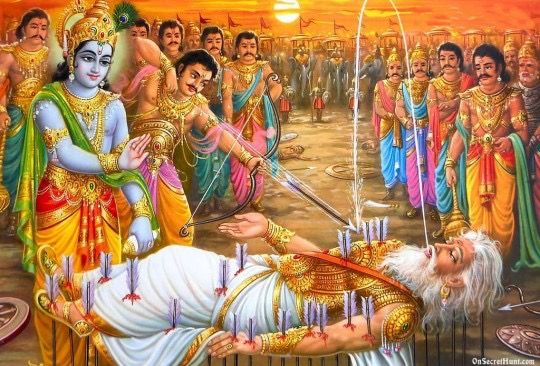
Shantanu fathered eight sons with his wife. As each of the first seven children was born, she cast them into the stream. The king mourned but said nothing for fear of loosing her altogether. When the eighth child was born, she seemed full of mirth and departed to drown the newborn baby. The grieving king lost patience. He followed and said to her, “Do not kill him! Who are you? Why do you harm your sons? Stay, wicked child killer; do not incur this dreadful sin!”
She responded stating that she would not kill their last son, but she could not live with him any longer, in accordance with the terms of the agreement they made before their union. She further indicated that she was the celestial river Ganga in human form. Their eight sons were the Vasus, deities of wealth. Sage Vasishtha had cursed them for their transgression to be born in human form. Vasus had approached her for redemption. She had promised to give them birth as human and free them from the curse as soon as they were born, except for the eighth Vasu. Her eighth son would have a long life.
Promising to return their eighth son to the king later, Ganga disappeared taking the child with her. She named her son Devavrat and took him to different realms. Devavrat was brought up and trained by eminent sages and scholars. Brihaspati the teacher of deities and Sukracharya the teacher of demons taught him political science and other branches of knowledge. Parashuram trained him in warfare. Indra bestowed celestial weapons on him. Sages Vasishtha, Chyavan, Sanatkumar and Markandey also taught him spiritual disciplines.
Years later, Shantanu was roaming on the banks of the Ganga reminiscing his past. He observed the flow of the river had become shallow. Walking upstream he noticed a youth who was blocking the water flow with a dam made up of arrows. When the king tried to speak to him, he vanished from the scene. Shantanu intuited that his surviving son would have looked like him by now. He addressed Ganga and asked for his son. Ganga appeared before him with their son Devavrat and presented him to the king. Shantanu returned home with his son and installed him as prince. Devavrat delighted the subjects with his valour and conduct and helped his father in royal responsibilities.
One day Shantanu visited a forest near river Yamuna. He smelt a wonderful fragrance. He searched for its source and traced it to a lovely girl. On enquiry, she told him that she was the daughter of a fisherman and her name was Satyavati. She ferried people across the river as instructed by her father.
The king was so impressed by her fragrance and beauty that he wanted to marry her. He went to her father to ask for her hand. The fisherman consented on a condition that her son should be consecrated as king after him. The king could not accept this condition. Devavrat was already appointed the prince and was on track to be the next king. The king returned home disappointed and felt disheartened. Devavrat noticed his condition and learned from a reliable elder the reason for his father’s state of mind.
He went to the fisherman and asked for his daughter as wife for his father. The fisherman repeated his condition. Devavrat declared that he renounced his claim to the kingship to satisfy the condition. To allay any chance of claim to the throne from his children, he further vowed to remain celibate, and never marry throughout his life.
Hearing his vows, celestial deities and sages showered flowers on him from the sky and said, “He is Bhishma” referring to his terrible vow. He became known as Bhishma.
Bhishma brought Satyavati to Hastinapur and presented her to his father. When Shantanu learnt about his vow, he felt obliged and offered him a boon that would allow him to die at time of his choosing. To dispel any danger to the kingdom in the future, Bhishma vowed to protect the kingdom and remain loyal to the throne of Hastinapur.
Shantanu wedded Satyavati. The couple had two sons named Chitrangad and Vichitravirya. After Shantanu’s death Bhishma installed Chitrangad as king. Chitrangad died in a battle with a Gandharva. Bhishma then installed Vichitravirya who was still a child, and acted under Bhishma’s instructions.
When Vichitravirya attained a marriageable age, Bhishma attended the Swayamvar that the king of Kashi had arranged for his three daughters, named Amba, Ambika and Ambalika. He announced his presence, as he was not invited, and abducted all the three girls for his half-brother Vichitravirya. He overcame resistance from king Salva and other potential suitors, and brought the girls home.
Ambika and Ambalika wedded Vichitravirya but Amba refused stating that she loved Salva and had chosen him as her husband. She was allowed to return to her lover but Salva refused to accept her. She returned to Bhishma and asked him to marry her. Bhishma could not marry due to his vow. Amba held Bhishma responsible for her predicament, and planned her revenge. She approached Parashuram for help, who unsuccessfully advised Bhishma to accept Amba as his wife. Then they fought for many days, and finally Bhishma defeated Parashuram. Later Amba prayed to Shiva, who granted her a boon to be able to be an accomplice in Bhishma’s death.
Vichitravirya died of consumption without producing an heir. On Bhishma’s suggestion, Satyavati summoned her son Vyas Dvaipayan. Sage Parasar had begotten Vyas on Satyavati before her marriage to Shantanu. Through the system of Niyoga with Vyas, Ambika gave birth to Dhritrastra and Ambalika to Pandu. Bhishma managed the kingdom until they grew to adulthood.
Pandu was installed as king since the elder brother Dhritrastra was blind from birth. Bhishma arranged their marriage. Dhritrastra married Gandhari and Pandu married Kunti and Madri. Hundred sons were born to Gandhari. They were called Kauravas. Duryodhan the eldest was their leader. Pandu had five sons, called Pandavas. Yudhisthir was the eldest who later became king. Pandu died due to a curse when his sons were still children. In his absence, Dhritrastra was invested with the throne under protection of Bhishma.
Bhishma engaged Guru Dronacharya as a teacher to educate all the princes. From early childhood Duryodhan displayed animosity towards Pandavas. His attitude was dangerous for harmony in the family.
Bhishma often counselled Duryodhan but he would not listen to him. King Dhritrastra was unable to take any action against his son. Bhishma also despised Karna whom he believed to be one of the main advisors of Duryodhan.
Bhishma became aware of the incident of Lakshagrih, the House of Lac only after Pandavas had escaped and returned home after marrying Draupadi. Duryodhan had conspired to burn Pandavas with their mother Kunti alive in the Lakshagrih.
Pandavas revered Bhishma highly. On his advice Yudhisthir designated Krishna as the chief guest of honour during his consecration as king of Indraprasth.
During disrobing of Draupadi at the game of dice, Bhishma remained a silent witness. He fought against Arjun, from the side of Kauravas during their confrontation with the army of Matsya king Virat.
When Pandavas returned from exile, Bhishma tried to convince Dhritrastra to return their share of the kingdom but could not prevail over Duryodhan’s contention.
During the peace mission of Krishna, Bhishma supported his proposal and witnessed his cosmic expansion in the assembly hall.
In the Mahabharat war, he accepted the role of commander in chief of the Kauravas army on the condition that he would not kill any of the Pandava brothers. Also, he barred Karna from joining the fight during his leadership of the army. He set up specific rules of the war that both parties accepted.
Bhishma fought for ten days. During the war he killed innumerable warriors. He even forced Krishna to break his vow of not taking a weapon to use in the war. On Yudhisthir’s request, Bhishma told him the tactics of how he could be killed.
On the tenth day, Shikhandi, the reincarnated Amba as male, attacked him. Bhishma considered Shikhandi a woman due to his previous birth, and as such, declined to engage in combat with him. From behind Shikhandi, Arjun pierced his body with arrows, felling him from his chariot. He remained suspended on the arrows, which were embedded all over his body except the head. This was the end of his fighting in the war.
Both Kaurava and Pandava chiefs visited him on his makeshift deathbed to offer respects. Bhishma asked for a support for his head. Duryodhan brought pillows, which he declined to accept. Arjun hit arrows below his head that made a fitting head-support for him. He further asked for water. Arjun pierced the earth with an arrow. Fresh water sprang out from the earth and poured in his mouth.
Karna also came to pay his respect and obtained blessings from him.
Bhishma did not die during the war thanks to the boon from his father that enabled him to choose his own time of death. Pandavas won the war. However, Yudhisthir remained grieving over the immense loss of life and utter destruction in the war.
Krishna knew that Bhishma was the storehouse of knowledge. He brought Yudhisthir to Bhishma who lay suspended on the bed of arrows. Krishna praised him for his knowledge and virtues and freed him from pain by touching his body. Bhishma informed them that he would relinquish his body in auspicious Uttarayan when the sun moved to the northern direction
Krishna requested him to dispel Yudhisthir’s grief. Bhishma agreed and gave a long sermon that continued for many days. He explained the nature of Dharma, duties of kings, duties of people in their different stages and classes, and answered queries from Yudhisthir on many spiritual, political and social issues.
Bhishma declared that Krishna was an incarnation of the supreme god Vishnu. He enumerated thousand names of Vishnu, known as Vishnu Sahastranam.
After the sermon, Yudhisthir’s grief was dispelled and he took up the kingship. When the time of Bhishma’s departure arrived, Yudhisthir came to see him. He noticed Bhishma surrounded by celestial sages. Bhishma greeted him and confirmed that his time of death was now and took leave of all.
Bhishma brought his breath under yogic control and released it through the top of his head. His life breath flew in the sky like a shining star. Pandavas cremated his body on the banks of River Ganga. Bhishma’s mother Ganga came to the site of cremation, lamenting. Krishna reminded her of the reason of her son’s birth and assured her that he had attained his position in heaven.
His death anniversary is commemorated as Bhishma Ashtami, on the eighth day of bright fortnight in the month of Magh (January-February).
Bhishma is the eldest character of the epic Mahabharat. He was a grandfather of both Kauravas and Pandavas.
In the epic, Bhishma Parva describes in detail his exploits in the war, and Shanti and Anushasan Parvas contain his discourses on various disciplines.

